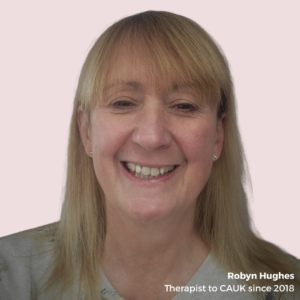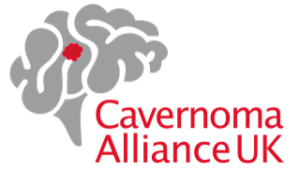Mental well-being
Struggling with your mental wellbeing is common after a cavernoma diagnosis. Feelings of anxiety, low mood or emotional overwhelm, especially after surgery, are completely natural responses to what you have been through. This page explores why mental health challenges can occur, what can help, and how Cavernoma Alliance UK can support you with counselling, peer connection and practical advice.
Struggling with your mental wellbeing is something many people with cavernoma experience. In fact, over 50% of our community tell us that mental wellbeing is one of their biggest challenges – whether that’s due to the emotional impact of diagnosis, the uncertainty of ‘wait and see’, adapting to symptoms like seizures or going through surgery.
Feelings of anxiety, low mood, or emotional overwhelm after surgery are especially common – and entirely valid. It’s important to know that this is not a sign of weakness or failure, but a natural response to everything your brain and body have been through.
What can help?
Many people benefit from talking therapies to help manage anxiety, depression, or the emotional strain of living with cavernoma. Common approaches include:
- Cognitive Behavioural Therapy (CBT) – helps you identify and change unhelpful thought patterns and behaviours.
- Interpersonal Therapy (IPT) – focuses on how relationships affect your mood and how to improve communication and connection.
- Acceptance and Commitment Therapy (ACT) – encourages acceptance of difficult emotions and reconnecting with what matters to you.
- Psychodynamic Therapy – explores how past experiences and unconscious thoughts affect current feelings and behaviours.
Some people find medication helpful – especially when symptoms are persistent or interfere with daily life. The most common group used are SSRIs (Selective Serotonin Reuptake Inhibitors), such as sertraline, fluoxetine or citalopram. These can take time to work and may need adjusting, but many people find them effective when combined with therapy or other support. Speak to your GP or neurologist about whether medication or another form of support could be helpful for you.
How can CAUK help?
You can access therapy through your GP or self-refer directly for NHS talking therapies via the NHS website. However, waiting lists can vary and are often long.
Cavernoma Alliance UK offers up to four free counselling sessions for UK resident members – with no waiting list. This is a chance to talk with our trained therapist, Robyn, who understands the impact of living with cavernoma.
- Sessions are available via Zoom or phone
- You don’t need a referral – become a CAUK member (it’s free), and then email helpline@cavernoma.org.uk to request.
Our therapy webpage provides more information. We also offer buddying, monthly online meet-ups, in-person meet-ups and helpline chats, visit our support pages to find out more.

Our thanks go to AXIOM Neuromonitoring, who kindly provide a grant that enables us to fund CAUK’s counselling service. Axiom is one of the UK’s leading neuromonitoring providers, working to support safer spine and neurosurgical procedures.
